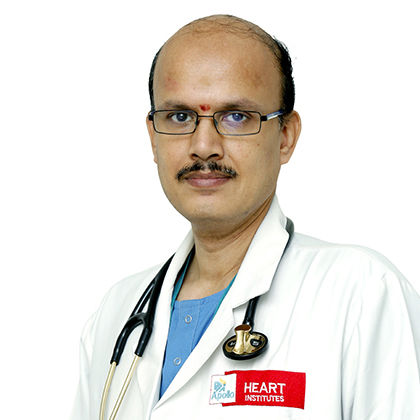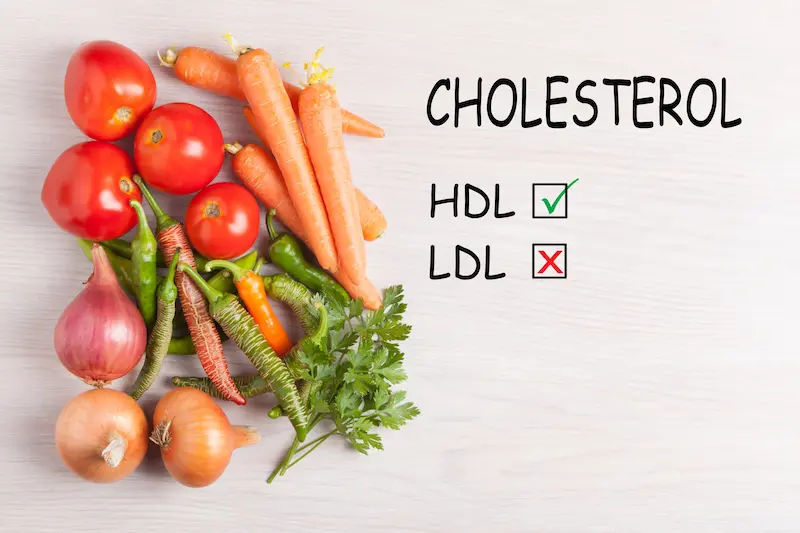How to Lower Cholesterol: Easy Tips for a Healthier Heart
Lowering cholesterol is key to heart health. Discover simple lifestyle changes, diet tips, and medical options to manage cholesterol effectively.

Written by
Last updated on 13th Jan, 2026
Introduction
Cholesterol is a fat-like substance that our body needs to stay healthy. It helps make essential things like hormones, vitamin D, and bile, which allows us to digest food. However, too much cholesterol in our blood can harm the heart. High cholesterol can cause fatty deposits to build up inside our blood vessels. These deposits can block blood flow and lead to problems like heart disease and strokes.
This article will show you some simple measures that help lower cholesterol and improve your heart health.
Understanding Cholesterol
Before discussing how to reduce cholesterol, it's essential to understand what cholesterol is and why it's crucial.
Cholesterol travels through your blood with the help of two types of proteins:
LDL (Bad Cholesterol): LDL brings cholesterol from your liver to other parts of your body. But if there’s too much LDL, it can build up on the walls of your blood vessels, causing a blockage. This makes it harder for blood to flow through your arteries and can lead to heart problems.
HDL (Good Cholesterol): HDL helps carry cholesterol back to the liver, which can be removed from the body. Having higher levels of HDL cholesterol helps protect against heart disease.
Triglycerides: These are other types of fat found in the blood. High levels of triglycerides can also increase the risk of heart disease.
Balancing LDL, HDL, and triglycerides is essential for your heart health. Let’s look at ways to lower cholesterol and keep your heart healthy.
How to Lower Cholesterol: Easy Lifestyle Changes
Making strategic lifestyle changes is one of the most effective ways to lower cholesterol and improve heart health. By adopting healthier habits, such as a balanced diet, regular exercise, and weight management, you can significantly reduce LDL levels and increase HDL cholesterol naturally, reducing your risk of cardiovascular diseases.
Here are some ways to get started:
1. Follow a Heart-Healthy Diet
What you eat plays an effective role in managing your cholesterol levels. A healthy diet can help lower LDL ("bad" cholesterol) and raise HDL ("good" cholesterol).
Foods to eat:
Fruits and Vegetables: These are full of vitamins and fibre, which can help lower cholesterol.
Whole Grains: Foods like oats, quinoa, and whole wheat bread are high in fibre, which helps lower LDL.
Legumes: Beans, lentils, and peas are packed with fibre that lowers cholesterol.
Healthy Fats: Include healthy fats from fish (salmon, mackerel) and nuts (walnuts, almonds). These fats help lower "bad" cholesterol and raise "good" cholesterol.
Foods to avoid:
Trans Fats: Trans fats in processed foods, baked goods, and margarine raise LDL and lower HDL. Avoid them as much as possible.
Saturated Fats: Foods like fatty meats, cheese, and full-fat dairy products can increase LDL. Try to limit these foods.
Refined Carbs and Sugary Snacks: White bread, sugary snacks, and soda can increase triglycerides and lower HDL, so it's best to eat them less often.
Try the Mediterranean diet:
The Mediterranean diet is a heart-healthy eating plan that focuses on whole, natural foods while limiting processed and unhealthy options. It helps improve cholesterol levels and supports overall cardiovascular health.
Rich in Healthy Fats: Olive oil, nuts, and seeds provide good fats that lower LDL ("bad") cholesterol and raise HDL ("good") cholesterol.
Abundant in Fruits and Vegetables: Loaded with antioxidants, vitamins, and fibre, these help reduce inflammation and improve heart health.
Whole Grains Over Refined Carbs: Foods like brown rice, quinoa, and whole wheat bread provide sustained energy and better cholesterol control.
Lean Proteins from Fish and Legumes: Fatty fish (like salmon and mackerel) contain omega-3s that support heart function, while beans and lentils offer plant-based protein.
Limited Processed Foods and Red Meat: Cutting back on processed snacks, sugary drinks, and red meat helps maintain balanced cholesterol levels.
2. Get Moving with Regular Exercise
Exercise is one of the best ways to improve cholesterol levels. Being active can raise HDL (good cholesterol), lower LDL (bad cholesterol), and reduce triglycerides. It can also help you maintain a healthy weight, which helps control cholesterol.
Types of exercises:
Aerobic Exercise: Walking, jogging, cycling, and swimming can boost your heart health. Target for at least 30 minutes of moderate exercise most days of the week.
Strength Training: Weight Lifting or doing bodyweight exercises (like squats and push-ups) can help improve overall health and boost metabolism.
High-Intensity Interval Training (HIIT): This workout alternates between intense bursts of exercise and short periods of rest. It is great for lowering cholesterol and losing fat.
3. Maintain a Healthy Weight
Being overweight can increase LDL (bad cholesterol) and triglycerides while lowering HDL (good cholesterol). Losing weight, especially belly fat, can help lower cholesterol levels. Even losing 5-10% of your body weight can make a big difference. Healthy eating and regular exercise can help you reach and maintain a healthy weight.
4. Quit Smoking
Smoking is terrible for your heart and your cholesterol. It lowers your HDL (good cholesterol) and damages your blood vessels, making it easier for plaque to build up in your arteries. When you quit smoking, your HDL cholesterol levels can increase, and your blood vessels can heal. Quitting also lowers your risk of heart disease and gives you more energy.
5. Limit Alcohol Intake
Excessive alcohol intake can contribute to high cholesterol levels and increase the risk of high blood pressure and liver disease. However, moderate alcohol intake may have some cardiovascular benefits.
Guidelines for alcohol consumption:
Moderate drinking: For women, this means no more than one drink per day, and for men, no more than two drinks per day.
One drink equals 5 ounces of wine, 12 ounces of beer, or 1.5 ounces of distilled spirits.
It's best to consult with a healthcare professional about alcohol consumption if you are concerned about your cholesterol levels or have a history of heart disease,
6. Medication and Supplements to Help Lower Cholesterol
Sometimes, lifestyle changes aren’t enough to lower cholesterol, and medications or supplements may be needed.
Medications that may be prescribed:
Statins: Statins are the most common medication to lower LDL cholesterol by blocking the enzyme that makes cholesterol in your liver.
Bile Acid Sequestrants: These drugs help lower cholesterol by removing bile acids from your body, which forces your liver to use cholesterol to make more bile.
PCSK9 Inhibitors: These injectable medications lower LDL by helping the liver remove more cholesterol from your blood.
Natural supplements one may consider:
Omega-3 Fatty Acids: Fish oil supplements can help lower triglycerides and balance cholesterol levels.
Plant Sterols: These are found in some foods and supplements and can help lower LDL cholesterol by blocking its absorption in your intestines.
Psyllium Fibre: This type of fibre can help lower cholesterol by binding to it in your digestive system and removing it.
Before starting any new supplements or medications, talk to your doctor.
7. Regularly Check Your Cholesterol
Since high cholesterol doesn’t always have symptoms, getting it checked regularly is essential. Your doctor will measure your total cholesterol, LDL, HDL, and triglycerides to see if they’re at healthy levels.
When should you get tested?
Adults over 20 should check their cholesterol every 4-6 years.
If you have risk factors like a family history of heart disease, you may need more frequent tests.
Conclusion
Lowering cholesterol is essential for a healthier heart and a longer life. You can reduce your cholesterol levels and protect your heart by eating a nutritious diet, exercising regularly, maintaining a healthy weight, quitting smoking, and limiting alcohol. If lifestyle changes aren’t enough, medications and supplements may help. Remember, improving your cholesterol is a long-term goal. Stay consistent, monitor your cholesterol, and talk to your doctor to stay on track for better heart health.
Consult Top Cardiologists
Consult Top Cardiologists

Dr. Tripti Deb
Cardiologist
40 Years • MBBS, MD, DM, FACC, FESC
Hyderabad
Apollo Hospitals Jubilee Hills, Hyderabad

Dr. Zulkarnain
General Physician
2 Years • MBBS, PGDM, FFM
Bengaluru
PRESTIGE SHANTHINIKETAN - SOCIETY CLINIC, Bengaluru

Dr. E Prabhakar Sastry
General Physician/ Internal Medicine Specialist
40 Years • MD(Internal Medicine)
Manikonda Jagir
Apollo Clinic, Manikonda, Manikonda Jagir
(175+ Patients)

Dr. Rakesh Gopal
Cardiologist
22 Years • “ Trained in Trans Aortic Valve Implantation ( TAVI ) from Mehmet Akif Ersoy Hospital Istanbul, Turkey “ & MD (General Medicine), FRCP (Glasglow)DNB( Cardiology), FESC, HICR Cert (Harvard University, USA), Angioplasty Training from Washington Adventist Hospital USA, Asan Medical Centre, Seoul Korea, Board certified in Cardio Oncology, ICOS- USA
Chennai
Apollo Hospitals Greams Road, Chennai
(100+ Patients)

Dr. Srinivasan K N
Cardiologist
11 Years • MD, DNB (Cardio)
Chennai
Apollo Hospitals Greams Road, Chennai
(200+ Patients)


.webp)